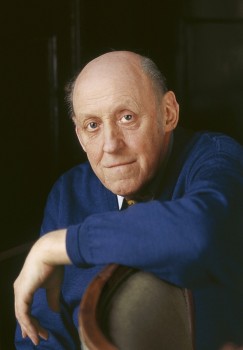Search results for "jarkko/2011/04/2010/05/song-without-words"
Rock or baroque?
30 April 2014 | Extracts, Non-fiction
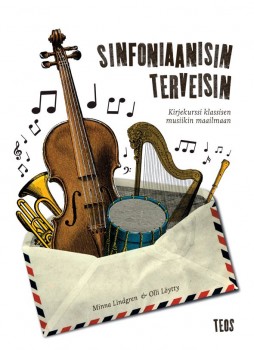 What if your old favourites lose their flavour? Could there be a way of broadening one’s views? Scholar Olli Löytty began thinking that there might be more to music than 1980s rock, so he turned to the music writer Minna Lindgren who was delighted by the chance of introducing him the enormous garden of classical music. In their correspondence they discussed – and argued about – the creativity of orchestra musicians, the significance of rhythm and whether the emotional approach to music might not be the only one. Their letters, from 2009 to 2013, an entertaining musical conversation, became a book. Extracts from Sinfoniaanisin terveisin. Kirjekurssi klassisen musiikin maailmaan (‘With symphonical greetings. A correspondence course in classical music’)
What if your old favourites lose their flavour? Could there be a way of broadening one’s views? Scholar Olli Löytty began thinking that there might be more to music than 1980s rock, so he turned to the music writer Minna Lindgren who was delighted by the chance of introducing him the enormous garden of classical music. In their correspondence they discussed – and argued about – the creativity of orchestra musicians, the significance of rhythm and whether the emotional approach to music might not be the only one. Their letters, from 2009 to 2013, an entertaining musical conversation, became a book. Extracts from Sinfoniaanisin terveisin. Kirjekurssi klassisen musiikin maailmaan (‘With symphonical greetings. A correspondence course in classical music’)
Olli, 19 March, 2009
Dear expert,
I never imagined that the day would come when I would say that rock had begun to sound rather boring. There are seldom, any more, the moments when some piece sweeps you away and makes you want to listen to more of the same. I derive my greatest enjoyment from the favourites of my youth, and that is, I think, rather alarming, as I consider people to be naturally curious beings whom new experiences, extending their range of experiences and sensations, brings nothing but good.
Singing along, with practised wistfulness, to Eppu Normaali’s ‘Murheellisten laulujen maa’ (‘The land of sad songs’) alone in the car doesn’t provide much in the way of inspiration. It really is time to find something new to listen to! My situation is already so desperate that I am prepared to seek musical stimulation from as distant a world as classical music. I know more about the African roots of rock than about the birth of western music, the music that is known as classical. But it looks and sounds like such an unapproachable culture that I badly need help on my voyage of exploration. Where should I start, when I don’t really know anything? More…
In memoriam Herbert Lomas 1924–2011
23 September 2011 | In the news
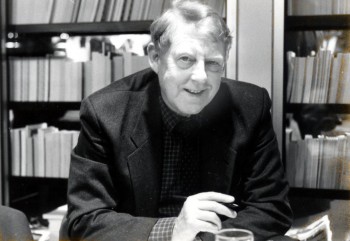
Herbert Lomas. Photo: Soila Lehtonen
Herbert Lomas, English poet, literary critic and translator of Finnish literature, died on 9 September, aged 87.
Born in the Yorkshire village of Todmorden, Bertie lived for the past thirty years in the small town of Aldeburgh by the North Sea in Suffolk. (Read an interview with him in Books from Finland, November 2009.)
After serving two years in India during the war, Bertie taught English first in Greece, then in Finland, where he settled for 13 years. His translations – as well as many by his American-born wife Mary Lomas (died 1986) – were published from as early as 1976 in Books from Finland.
Bertie’s first collection of poetry (of a total of ten) appeared in 1969. His Letters in the Dark (1986) was an Observer book of the year, and he was the recipient of several literary prizes. His collected poems, A Casual Knack of Living, appeared in 2009.
In England Bertie won the Poetry Society’s 1991 biennial translation award for one of his anthologies, Contemporary Finnish Poetry. The Finnish government recognised his work in making Finnish literature better known when it made him a Knight First Class of Order of the White Rose of Finland in 1987.
To Books from Finland, he made an invaluable contribution over almost 35 years – an incredibly long time in the existence of a small literary magazine. The number of Finnish authors and poets whose work he made available in English is countless: classics, young writers, novelists, poets, dramatists.
Bertie’s speciality was ‘difficult’ poets, whose challenge lay in their use of end-rhymes, special vocabulary, rhythm or metre. He loved music, so the sounds and tones of words, their musicality, were among the things that fascinated him. Kirsi Kunnas’ hilarious, limerick-inspired children’s rhymes were among his best translations – although actually nothing in them would make the reader think that the originals might not have been written in English. A sample: There once was a crane / whose life was led / as a uniped. / It dangled its head / and from time to time said:/ It would be a pain / if I looked like a crane. (From Tiitiäisen satupuu, ‘Tittytumpkin’s fairy tree’, 1956, published in Books from Finland 1/1979.)
Bertie also translated work by Eeva-Liisa Manner, Paavo Haavikko, Mirkka Rekola, Pentti Holappa, Ilpo Tiihonen, Aaro Hellaakoski and Juhani Aho among many, many others; for example, the prolific writer Arto Paasilinna’s best-known novel, Jäniksen vuosi / The Year of the Hare, appeared in his translation in 1995. Johanna Sinisalo’s unusually (in the Finnish context) non-realist troll novel Ennen päivänlaskua ei voi / Not Before Sundown, subsequently translated into many other languages, appeared in 2003. His last translation for Books from Finland was of new poems by Vilja-Tuulia Huotarinen in 2009.
It was always fun to talk with Bertie about translations, language(s), writers, books, and life in general. He himself said he was a schoolboy at heart – which is easy to believe. He was funny, witty, inventive, impulsive, sometimes impatient – and thoroughly trustworthy: he just knew how to find the precise word, tone of voice, figure of speech. He had perfect poetic pitch. As dedicated and incredibly versatile translators are really hard to find anywhere, we all realise our good fortune – both for Finnish literature and for ourselves – to have worked, and enjoyed with such enjoyment, with Bertie.
Poet Aaro Hellaakoski (1893–1956) was not a self-avowed follower of Zen, but his last poems, in particular, show surprisingly close contacts with the philosophy. ‘Secrets of existence are revealed once one ceases seeking them’, the literary scholar Tero Tähtinen wrote in an essay published alongside Bertie’s new Hellaakoski translations in (the printed) Books from Finland (2/2007). Bertie was fond of Hellaakoski, whose existential verses fascinated him; among his 2007 translations is The new song (from Vartiossa, ‘On guard’, 1941):
The new song |
Uusi laulu |
| No compulsion, not a sting. | Ei mitään pakota, ei polta. |
| My body doesn’t seem to be. | On ruumis niinkuin ei oisikaan. |
| As if a nightbird started to sing | Kuin alkais kaukovainioilta |
| its far shy carol from some tree – | yölintu arka lauluaan |
| as if from its dim chrysalis | kuin hyönteistoukka heräämässä |
| a little grub awoke to bliss – | ois kotelossaan himmeässä |
| or someone struck from off his shoulder | kuin hartioiltaan joku loisi |
| a miserable old bugaboo – | pois köyhän muodon entisen |
| and a weird flying creature | ja outo lentäväinen oisi |
| stretched a fragile wing and flew. | ja nostais siiven kevyen. |
| Ah limitless bright light: | Oi kimmellystä ilman pielen. |
| the gift of lyrical flight! | Oi rikkautta laulun kielen. |
Finlandia Prize candidates 2011
17 November 2011 | In the news
 The candidates for the Finlandia Prize for Fiction 2011 are Eeva-Kaarina Aronen, Kristina Carlson, Laura Gustafsson, Laila Hirvisaari, Rosa Liksom and Jenni Linturi.
The candidates for the Finlandia Prize for Fiction 2011 are Eeva-Kaarina Aronen, Kristina Carlson, Laura Gustafsson, Laila Hirvisaari, Rosa Liksom and Jenni Linturi.
Their novels, respectively, are Kallorumpu (‘Skull drum’, Teos), William N. Päiväkirja (‘William N. Diary’, Otava), Huorasatu (‘Whore tale’, Into), Minä, Katariina (‘I, Catherine’, Otava), Hytti no 6 (‘Compartment number 6’, WSOY) and Isänmaan tähden (‘For fatherland’s sake’, Teos).
Kallorumpu takes place in 1935 in Marshal Mannerheim’s house in Helsinki and in the present time. Laila Hirvisaari is a popular writer of mostly historical fiction: Minä, Katariina, a portrait of Russia’s Catherine the Great, is her 39th novel. Gustafsson’s and Linturi’s novels are first works; the former is a bold farce based on women’s mythology, the latter is about guilt born of the Second World War.
The jury – journalist and critic Hannu Marttila, journalist Tuula Ketonen and translator Kristiina Rikman – made their choice out of 130 novels. The winner, chosen by the theatre manager of the KOM Theatre Pekka Milonoff, will be announced on the first of December. The prize is worth 30,000 euros. It has been awarded since 1984, to novels only from 1993.
The fact that this time all the candidates are women has naturally been the object of criticism: why are the popular male writers’ books of 2011 missing from the list?
Another thing that these novels share is history: five of them are totally or partially set in the past – Finland in 1935, Paris in the 1890s, Russia/Soviet Union in the 18th century and in the 1980s, and 1940s Finland during the Second World War. Even the sixth, Huorasatu, bases its depiction of the present day in women’s prehistory, patriarchy and the ancient myths.
The jury’s chair, Hannu Marttila, commented: ‘This book year is sure to be remembered for a generational and gender change among those who write literature about the Second World War in Finland. Young woman writers describe the war with probably greater diversity than before. From the non-fiction writing of recent years it is clear that the struggles and difficulties of the home front are increasingly being recognised as part of the general struggle for survival, and on the other hand the less heroic aspects of war, the shameful and criminal elements, have also become acceptable as objects of study.’
Marttila concluded his speech: ‘When picking mushrooms in the forest, I have learned that it is often worth humbly peeking under the grass, and that the most glaring cap is not necessarily the best…. Perhaps it is time to forget the old saying that there is literature, and then there is women’s literature.’
Serious comics: Angoulême 2011
24 February 2011 | This 'n' that

Graphic artist Milla Paloniemi went to Angoulême, too: read more through the link (Milla Paloniemi) in the text below
As a little girl in Paris, I dreamed of going to the Angoulême comics festival – Corto Maltese and Mike Blueberry were my heroes, and I liked to imagine meeting them in person.
20 years later, my wish came true – I went to the festival to present Finnish comics to a French audience! I was an intern at FILI – Finnish Literature Exchange, and for the first time, FILI had its own stand at Angoulême in January 2011.
Finnish comics have become popular abroad in recent years, which is particularly apparent in the young artists’ reception by readers in Europe. Angoulême isn’t just a comics Mecca for Europeans, however: there were admirers of Matti Hagelberg, Marko Turunen and Tommi Musturi from as far away as Japan and Korea.
The festival provides opportunities to present both general ‘official’ comics, ‘out-of-the-ordinary’ and unusual works. The atmosphere at the festival is much wilder than at a traditional book fair: for four days the city is filled with publishers, readers, enthusiasts, artists, and even musicians. People meet in the evenings at le Chat Noir bar to discuss the day’s finds, sketching their friends and the day’s events.
As one Belgian publisher told me, ‘There have always been Finns at Angoulême.’ Staff from comics publisher Kutikuti and many others have been making the rounds at Angoulême for years, walking through the city and festival grounds, carrying their backpacks loaded with books. They have been the forerunners to whom we are grateful, and we hope that our collaboration with them deepens in the future.
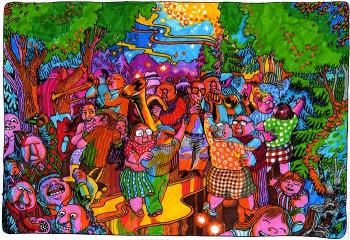
Aapo Rapi: Meti (Kutikuti, 2010)
This year two Finnish artists, Aapo Rapi and Ville Ranta were nominated for the Sélection Officielle prize, which gave them wider recognition. Rapi’s Meti is a colourful graphic novel inspired by his own grandmother Meti [see the picture right: the old lady with square glasses].
Hannu Lukkarinen and Juha Ruusuvuori were also favorites, as all the available copies of Les Ossements de Saint Henrik, the French translation of their adventures of Nicholas Grisefoth, sold out. There were also fans of women comics artists, searching feverishly for works by such artists as Jenni Rope and Milla Paloniemi.
Chatting with French publishers and readers, it became clear that Finnish comics are interesting for their freshness and freedom. Finnish artists dare to try every kind of technique and they don’t get bogged down in questions of genre. They said so themselves at the festival’s public event. According to Ville Ranta, the commercial aspect isn’t the most important thing, because comics are still a marginalised art in Finland. Aapo Rapi claimed that ‘the first thing is to express my own ideas, for myself and a couple of friends, then I look to see if it might interest other people.’
Hannu Lukkarinen emphasised that it’s hard to distribute Finnish-language comics to the larger world: for that you need a no-nonsense agent like Kirsi Kinnunen, who has lived in France for a long time doing publicity and translation work. Finnish publishers haven’t yet shown much interest in marketing comics, but that may change in the future.
These Finnish artists, many of them also publishers, were happy at Angoulême. Happy enough, no doubt, to last them until next year!
Translated by Lola Rogers
In pursuit of a conscience
19 March 2012 | Drama, Fiction
‘An unflinching opera and a hot-blooded cantata about a time when the church was torn apart, Finland was divided and gays stopped being biddable’: this is how Pirkko Saisio’s new play HOMO! (music composed by Jussi Tuurna) is described by the Finnish National Theatre, where it is currently playing to full houses. This tragicomical-farcical satire takes up serious issues with gusto. In this extract we meet Veijo Teräs, troubled by his dreams of Snow White, who resembles his steely MP wife Hellevi – and seven dwarves. Introduction by Soila Lehtonen

Dictators and bishops: Scene 15, ‘A small international gay opera’. Photographs: The Finnish National Theatre / Laura Malmivaara, 2011
CAST OF CHARACTERS
Veijo Teräs
Hellevi, Veijo’s wife and a Member of Parliament
Hellevi’s Conscience
Rebekka, Hellevi and Veijo’s daughter
Moritz, Hellevi and Veijo’s godson
Agnes af Starck-Hare, Doctor of Psychiatry
Seven Dwarves
Tom of Finland
Atik
The Bishop of Mikkeli
Adolf Hitler
Albert Speer
Josef Stalin
Old gays: Kale, Jorma, Rekku, Risto
Olli, Uffe,Tiina, Jorma: people from SETA [the Finnish LGBT association]
Second Lieutenant, Private Teräs, the men in the company
A Policeman
Big Gay, Little Gay, Middle Gay
William Shakespeare
Hermann Göring
Hans-Christian Andersen
Teemu & Oskari, a gay couple
The Apostle Paul
Father Nitro
Winston Churchill
SCENE ONE
On the stage, a narrow closet.
Veijo Teräs appears, struggling to get out of the closet.
Veijo Teräs is dressed as a prince. He is surprised and embarrassed to see that the audience is already there. He seems to be waiting for something.
He speaks, but continues to look out over the audience expectantly.
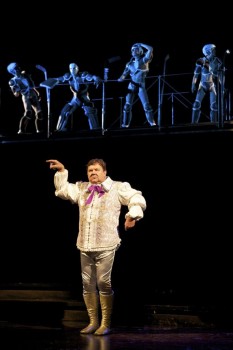
Snow White's spouse, Veijo (Juha Muje), and the dwarves. Photo: Laura Malmivaara, 2011
VEIJO
This outfit isn’t specifically for me, because… I mean, it’s part of this whole thing. This Snow White thing. I’m waiting for the play to start. Just like you are. My name is Veijo Teräs and I’m playing the point of view role in this story. Writers put point of view roles like this in their plays nowadays. They didn’t use to.
Just to be clear – this isn’t a ballet costume. I’m not going to do any ballet dancing, but I won’t mind if someone dances, even if it’s a man. Particularly if it’s a man. But I don’t watch. Ballet, I mean. Not at the opera house, or on television, or anywhere, and I have no idea why we had to bring up ballet – or I had to bring it up – because this is a historical costume, so it’s appropriate. This is what men used to wear, real men like Romeo and Hamlet, or Cyrano de Bergerac. But we in the theatre these days have a hell of a job getting an audience to listen to what a man has to say when he’s standing there saying what he has to say in an outfit like this. People get the idea that it’s a humorous thing, but this isn’t, this Snow White thing, where I play the prince. Snow White is waiting in her glass casket, she died from an apple, which seems to have become the Apple logo, Lord knows why, the one on the laptops you see on the tables of every café in town. More…
Success after success
9 March 2012 | This 'n' that
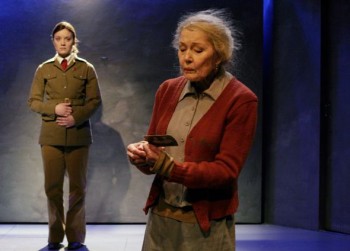
The women of Purge: Elena Leeve and Tea Ista in Sofi Oksanen's Puhdistus at the Finnish National Theatre, directed by Mika Myllyaho. Photo: Leena Klemelä, 2007
Sofi Oksanen’s Purge, an unparalleled Finnish literary sensation, is running in a production by Arcola Theatre in London, from 22 February to 24 March.
First premiered at the Finnish National Theatre in Helsinki in 2007, Puhdistus, to give it its Finnish title, was subsequently reworked by Oksanen (born 1977) into a novel – her third.
Puhdistus retells the story of her play about two Estonian women, moving through the past in flashbacks between 1939 and 1992. Aliide has experienced the horrors of the Stalin era and the deportation of Estonians to Siberia, but has to cope with the guilt of opportunism and even manslaughter. One night in 1992 she finds a young woman in the courtyard of her house; Zara has just escaped from the claws of members of the Russian mafia who held her as a sex slave. (Maya Jaggi reviewed the novel in London’s Guardian newspaper.) More…
Love is the only song
7 August 2014 | Fiction, poetry
Poems from Helise, taivas! Valitut runot (‘Ring out, sky! Selected poems’, Siltala, 2014). Introduction by Marja-Leena Mikkola
Who will tell me?
Who will tell me why white butterflies
strew the velvet skin of the night?
Who will tell me?
While people walk, mute and strange
and they have snowy, armoured faces,
such snowy faces!
and the eyes of a stuffed bird.
Who will tell me why in the morning, on the grass,
the thrushes begin their secret game?
Who will tell me?
While black soldiers stand at the gate
in their hands withered roses
such withered roses!
and broken tiger lilies.
Who will tell me, quietly in the sun’s shadow
how to bare my heart?
Who will tell me?
Come to me over the fields
Come close and softly
so softly!
Open the clothes of my heart. More…
How love begins
31 March 1992 | Archives online, Fiction, Prose
A short story from Kuinka rakkaus syntyy (‘How love is born’; Otava, 1991)
All that day the words of the song ran through Annika’s mind.
‘How love begins, nobody knows’: those were the words with which the clock radio had woken her this morning.
They had bought a clock radio so as not to have to listen to the ticking of a clock in the dark, echoing room, or its ear-splitting alarm, like the screaming of a small wounded animal.
They had bought other things, too, to make their lives easier: a dish-washer, and a washing machine that also dried the clothes, and a microwave oven, and a second telephone, because the flat was a big one. Life went on; there was plenty of time to be, and to think about what had been, and what could have been, and what would come to be. More…
Helsinki Book Fair 2011
2 November 2011 | In the news
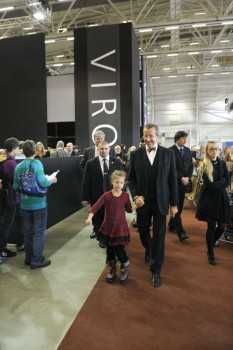
President Toomas Hendrik Ilves at the Book Fair: Viro is Estonia in Finnish. Photo: Kimmo Brandt/The Finnish Fair Corporation
The Helsinki Book Fair, held from 27 to 30 October, attracted more visitors than ever before: 81,000 people came to browse and buy books at the stands of nearly 300 exhibitors and to meet more than a thousand writers and performers at almost 700 events.
The Music Fair, the Wine, Food and Good Living event and the sales exhibition of contemporary art, ArtForum, held at the same time at Helsinki’s Exhibition and Convention Centre, expanded the selection of events and – a significant synergetic advantage, of course – shopping facilities. Twenty-eight per cent of the visitors thought this Book Fair was better than the previous one held in 2010.
According to a poll conducted among three hundred visitors, 21 per cent had read an electronic book while only 6 per cent had an e-book reader of their own. Twenty-five per cent did not believe that e-books will exceed the popularity of printed books, and only three per cent believed that e-books would win the competition.
Estonia was the theme country this time. President Toomas Hendrik Ilves of the Republic of Estonia noted in his speech at the opening ceremony: ‘As we know well from the fate of many of our kindred Finno-Ugric languages, not writing could truly mean a slow national demise. So publish or perish has special meaning here. Without a literary culture, we would simply not exist and we have known this for many generations, since the Finnish and Estonian national epics Kalevala and Kalevipoeg. – During the last decade, more original literature and translations have been published in Estonia than ever before. And we need only access the Internet to glimpse the volume of text that is not printed – it is even larger than the printed corpus. We live in an era of flood, not drought, and thus it is no wonder that as a discerning people, we do not want to keep our ideas and wisdom to ourselves but try to share and distribute them more widely. The idea is not to try to conquer the world but simply, with our own words, to be a full participant in global literary culture, and in the intellectual history and future of humankind.’
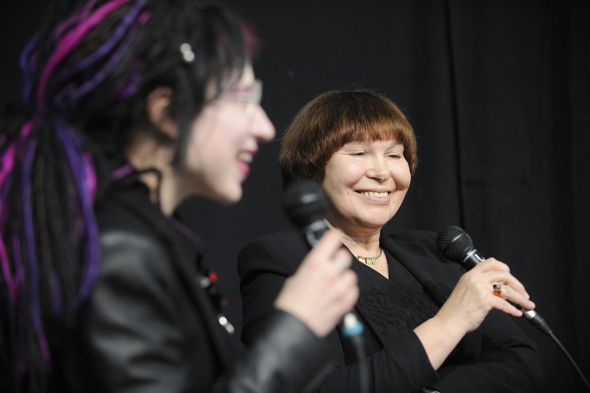
Finland meets Estonia: authors Sofi Oksanen and Viivi Luik in discussion. Photo: Kimmo Brandt/The Finnish Fair Corporation
Finlandia Prize for Fiction 2011
1 December 2011 | In the news
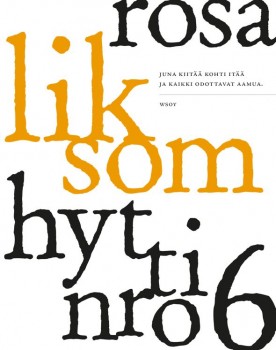 The winner of the Finlandia Prize for Fiction 2011, worth €30,000, is Rosa Liksom, for her novel Hytti no 6 (‘Compartment number 6’, WSOY): read translated extracts and an introduction of the author here on this page.
The winner of the Finlandia Prize for Fiction 2011, worth €30,000, is Rosa Liksom, for her novel Hytti no 6 (‘Compartment number 6’, WSOY): read translated extracts and an introduction of the author here on this page.
The prize was awarded on 1 December. The winner was selected by the theatre manager Pekka Milonoff from a shortlist of six.
‘Hytti nro 6 is an extraordinarily compact, poetic and multilayered description of a train journey through Russia. The main character, a girl, leaves Moscow for Siberia, sharing a compartment with a vodka-swilling murderer who tells hair-raising stories about his own life and about the ways of his country. – Liksom is a master of controlled exaggeration. With a couple of carefully chosen brushstrokes, a mini-story, she is able to conjure up an entire human destiny,’ Milonoff commented.
Author and artist Rosa Liksom (alias Anni Ylävaara, born 1958), has since 1985 written novels, short stories, children’s book, comics and plays. Her books have been translated into 16 languages.
Appointed by the Finnish Book Foundation, the prize jury (journalist and critic Hannu Marttila, journalist Tuula Ketonen and translator Kristiina Rikman) shortlisted the following novels: Kallorumpu (‘Skull drum’, Teos) by Eeva-Kaarina Aronen, William N. Päiväkirja (‘William N. Diary’, Otava) by Kristina Carlson, Huorasatu (‘Whore tale’, Into) by Laura Gustafsson, Minä, Katariina (‘I, Catherine’, Otava) by Laila Hirvisaari, and Isänmaan tähden (‘For fatherland’s sake’, first novel; Teos) by Jenni Linturi.
Rosa Liksom travelled a great deal in the Soviet Union in the 1980s. She said she hopes that literature, too, could play a role in promoting co-operation between people, cultures and nations: ‘For the time being there is no chance of some of us being able to live on a different planet.’
Best Translated Book Award 2011
13 May 2011 | In the news
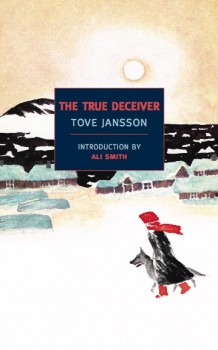 Thomas Teal’s translation from Swedish into English of Tove Jansson’s novel Den ärliga bedragaren (Schildts, 1982), entitled The True Deceiver (published by New York Review Books, 2009), won the 2011 Best Translated Book Award in fiction (worth $5,000; supported by Amazon.com). The winning titles and translators for this year’s awards were announced on 29 April in New York City as part of the PEN World Voices Festival.
Thomas Teal’s translation from Swedish into English of Tove Jansson’s novel Den ärliga bedragaren (Schildts, 1982), entitled The True Deceiver (published by New York Review Books, 2009), won the 2011 Best Translated Book Award in fiction (worth $5,000; supported by Amazon.com). The winning titles and translators for this year’s awards were announced on 29 April in New York City as part of the PEN World Voices Festival.
Organised by Three percent (the link features a YouTube recording from the award ceremony, introducing the translator, Thomas Teal [fast-forward to 7.30 minutes]) at the University of Rochester, and judged by a board of literary professionals, the Best Translated Book Award is ‘the only prize of its kind to honour the best original works of international literature and poetry published in the US over the previous year’. ‘Subtle, engaging and disquieting, The True Deceiver is a masterful study in opposition and confrontation’, said the jury.
Tove Jansson (1914–2001), mother of the Moomintrolls, story-teller and illustrator of children’s books, translated into 40 languages, began to write novels and short stories for adults in her later years. Psychologically sharp studies of relationships, they are written with cool understatement and perception.
Quality writing will work its way into a wider knowledge (i.e. a bigger language and readership) eventually… even though occasionally it may seem difficult to know where exactly it comes from; in a review published in the London Guardian newspaper, the eminent writer Ursula K. Le Guin assumed Tove Jansson was Swedish.
Government Prize for Translation 2011
24 November 2011 | In the news
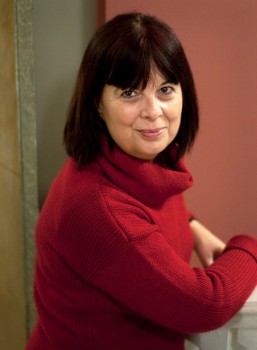
María Martzoúkou. Photo: Charlotta Boucht
The Finnish Government Prize for Translation of Finnish Literature of 2011 – worth € 10,000 – was awarded to the Greek translator and linguist María Martzoúkou.
Martzoúkou (born 1958), who lives in Athens, where she works for the Finnish Institute, has studied Finnish language and literature as well as ancient Greek at the Helsinki University, where she has also taught modern Greek. She was the first Greek translator to publish translations of the Finnish epic, the Kalevala: the first edition, containing ten runes, appeared in 1992, the second, containing ten more, in 2004.
‘Saarikoski was the beginning,’ she says; she became interested in modern Finnish poetry, in particular in the poems of Pentti Saarikoski (1937–1983). As Saarikoski also translated Greek literature into Finnish, Martzoúkou found herself doubly interested in his works.
Later she has translated poetry by, among others, Tua Forsström, Paavo Haavikko, Riina Katajavuori, Arto Melleri, Annukka Peura, Pentti Saaritsa, Kirsti Simonsuuri and Caj Westerberg.
Among the Finnish novelists Martzoúkou has translated are Mika Waltari (five novels; the sixth, Turms kuolematon, The Etruscan, is in the printing press), Väinö Linna (Tuntematon sotilas, The Unknown Soldier) and Sofi Oksanen (Puhdistus, Purge).
María Martzoúkou received her award in Helsinki on 22 November from the minister of culture and sports, Paavo Arhinmäki. Thanking Martzoúkou for the work she has done for Finnish fiction, he pointed out that The Finnish Institute in Athens will soon publish a book entitled Kreikka ja Suomen talvisota (‘Greece and the Finnish Winter War’), a study of the relations of Finland and Greece and the news of the Winter War (1939–1940) in the Greek press, and it contains articles by Martzoúkou.
The prize has been awarded – now for the 37th time – by the Ministry of Education and Culture since 1975 on the basis of a recommendation from FILI – Finnish Literature Exchange.
Song without words
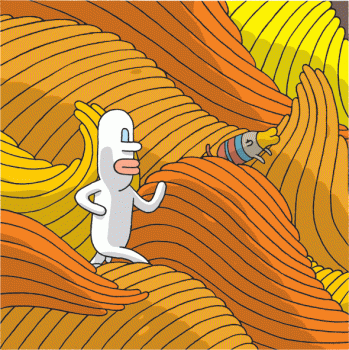
The episode we feature here is from Samuelin matkassa (‘Walking with Samuel’, Huuda Huuda, 2009; the book has been also published in Germany, Belgium, Sweden and Portugal)
Our lives are now more surrounded with images – moving or still, narratives or icons, emblems and symbols – than ever before – but do we know how to interpret them? How well can we read pictures?
Try this: Samuel is a cartoon character, created by Tommi Musturi, who wanders through time and a fantastically colourful universe of his own. His story is told in pictures, not words – and the details speak volumes. It tells, as you will find if you ‘read’ it carefully, about friendship between man and… another creature. More…
Finlandia Junior Prize 2011
7 December 2011 | In the news
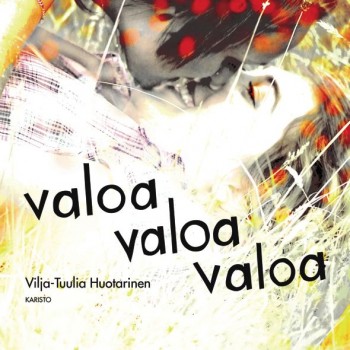 The musician Paula Vesala has chosen, from a shortlist of six, a book for young people by the poet Vilja-Tuulia Huotarinen, Valoa valoa valoa (‘Light light light’, Karisto). The story, which is set at the time of the Chernobyl nuclear power station disaster, poetically describes the passion and pain of first love, longing for mother and death.
The musician Paula Vesala has chosen, from a shortlist of six, a book for young people by the poet Vilja-Tuulia Huotarinen, Valoa valoa valoa (‘Light light light’, Karisto). The story, which is set at the time of the Chernobyl nuclear power station disaster, poetically describes the passion and pain of first love, longing for mother and death.
‘Not just what is told, but how it is told. The rythm and timbre of Vilja-Tuulia Huotarinen’s language are immensely beautiful. Her phrases do not exist merely to tell the story, but live like poetry or song. Valoa valoa valoa does not incline toward young people from the world of adults; rather, its voice comes, direct and living, from painful, confusing, complex youth, in which young people should really be protected from adults and their blindness. I would have liked to read this book when I was fourteen,’ commented Vesala.
The other five shortlisted books were a picture book for small children, Rakastunut krokotiili (‘Crocodile in love’, Tammi) by Hannu Hirvonen & Pia Sakki, a philosophical picture book about being different and courageous entitled Jättityttö ja Pirhonen (‘Giant girl and Pirhonen’, Tammi) by Hannele Huovi and Kristiina Louhi; a dystopic story set in the 2300s, Routasisarukset (‘Sisters of permafrost’, WSOY), by Eija Lappalainen & Anne Leinonen; a novel about the war experiences of an Ingrian family, Kaukana omalta maalta (‘Far away from homeland’, WSOY) by Sisko Latvus and an illustrated book about gods and myths of the world, Taivaallinen suurperhe (‘Extended heavenly family’, Otava) by Marjatta Levanto & Julia Vuori.
The prize, awarded by the Finnish Book Foundation on 23 November, is worth €30,000.

